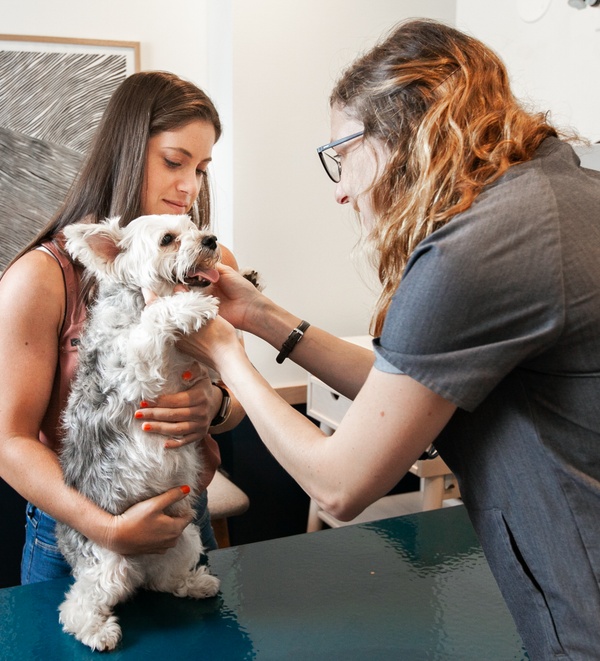
What You Need to Know About Parvo
Two significant viral diseases we see are caused by a virus in the Parvovirus genus — canine parvovirus (CPV) in dogs, and feline panleukopenia virus (FPV) in cats. Although CPV has been shown to infect and cause disease in both felines and canines, FPV has only been shown to affect felines. However, both forms of this contagious virus can be very serious in puppies and kittens, and often requires hospitalization at a 24-hour facility if a true infection develops. While more common in young pets, CPV and FPV can infect unvaccinated adult dogs and cats, too
While parvovirus can be very persistent in the environment, which increases the risk of your pet contracting it, vaccination has been shown to be highly effective.
How Does Parvovirus Work?
Both CPV and FPV are viruses, which spread by replicating in cells of the host body (your pet). These viruses attack rapidly dividing cells in areas like the bone marrow and the cells that line the intestinal tract. That's why the major clinical signs we see in a parvo infection are related to GI symptoms such as vomiting and diarrhea, along with low white blood cell counts.
Following infection in a susceptible pet, CPV and FPV are shed from GI tract, which means fecal material can spread this disease to other animals. Shedding can occur even before clinical signs appear in the infected dog or cat.
Is My Pet at Risk?
Unvaccinated dogs and cats have the highest risk for their respective parvoviruses. Young puppies and kittens are initially protected if their mother had been properly vaccinated. Antibodies to parvovirus and other diseases as passed to the puppies and kittens in their mothers’ milk, though this protection wanes overtime, which is why it's important to bolster your pet's immune system with a parvovirus vaccination.
Note that certain dog breeds are considered to be at higher risk for canine parvovirus. These include Rottweilers, Pitbulls, Doberman Pinscher, Springer Spaniels, and German Shepherds.
What Are Parvo Symptoms?
Early clinical signs in both canines and felines include fever, depression, and a loss of appetite. As the disease progresses, your pet may have diarrhea and vomiting; the diarrhea may eventually turn bloody. If your puppy is very young, CPV can infect the heart, leading to inflammation of heart muscle.
Regardless of the cause, loss of appetite, uncontrolled vomiting, diarrhea and/or bloody diarrhea (hematochezia) would all be grounds to seek veterinary care for your puppy or kitten. Blood work can show a low white blood cell count (leukopenia) in dogs and cats. If your cat or dog shows any of these symptoms, your veterinarian will recommend a fecal test for the parvovirus.
How is Parvovirus Treated in Dogs and Cats?
There is no specific antiviral treatment for parvovirus; treatment focuses on intensive care to afford the patient time to fight off the viral infection.
Because the pet is losing hydration from the vomiting and diarrhea and is often not eating, intravenous fluid therapy is a very important part of treating a puppy or kitten with parvovirus infection. It can also help provide electrolytes and sugar (dextrose) to the patient. Your vet may also prescribe anti-vomiting medications (antiemetics) to help treat vomiting and nausea.
Your vet may also prescribe antibiotics to prevent secondary infections from taking hold while the patient is in a weakened state from the virus.
Given the intensity of treatment required in many patients, referral to a 24-hour facility is often recommended. Prognosis is often dependent on the level of treatment provided. Studies have shown a survival rate of ~10% in untreated puppies and >90% in those that received intensive treatment — so timely treatment is essential.
Can I Prevent Parvovirus?
An important part of being a pet owner is ensuring your pet stays up to date on vaccinations. Proper vaccination of puppies and kittens is the key to preventing these diseases. The core vaccination recommendations for both puppies and kittens include vaccines against canine parvovirus and the feline panleukopenia virus (also called feline distemper).
Puppies and kittens are given several vaccinations from around 6-16 weeks of age. The vaccination happens in steps to ensure at least one of the vaccinations forms a "memory" of the virus in your pet's maturing immune system, which will help prevent infection in the long run.
Additionally, if you do become in contact with a sick dog, make sure to shower (or at least wash your hands) and change your clothes before coming in contact with other pets.
A note on vaccination...
In an environment like New York City, it's recommended to keep your new puppy or kitten indoors until they are fully vaccinated (usually 16 weeks of age). We recommend that puppies avoid areas where dogs congregate, like dog parks, until they are fully vaccinated to minimize the risk they come into contact with an infected dog. In shelter, doggy daycare, and breeding facility situations, proper environmental decontamination with a bleach solution is essential (but difficult) following a parvovirus outbreak. CPV is a very resilient virus, and can survive on surfaces such as kennels and food and water bowls, for up to a year if not properly decontaminated.